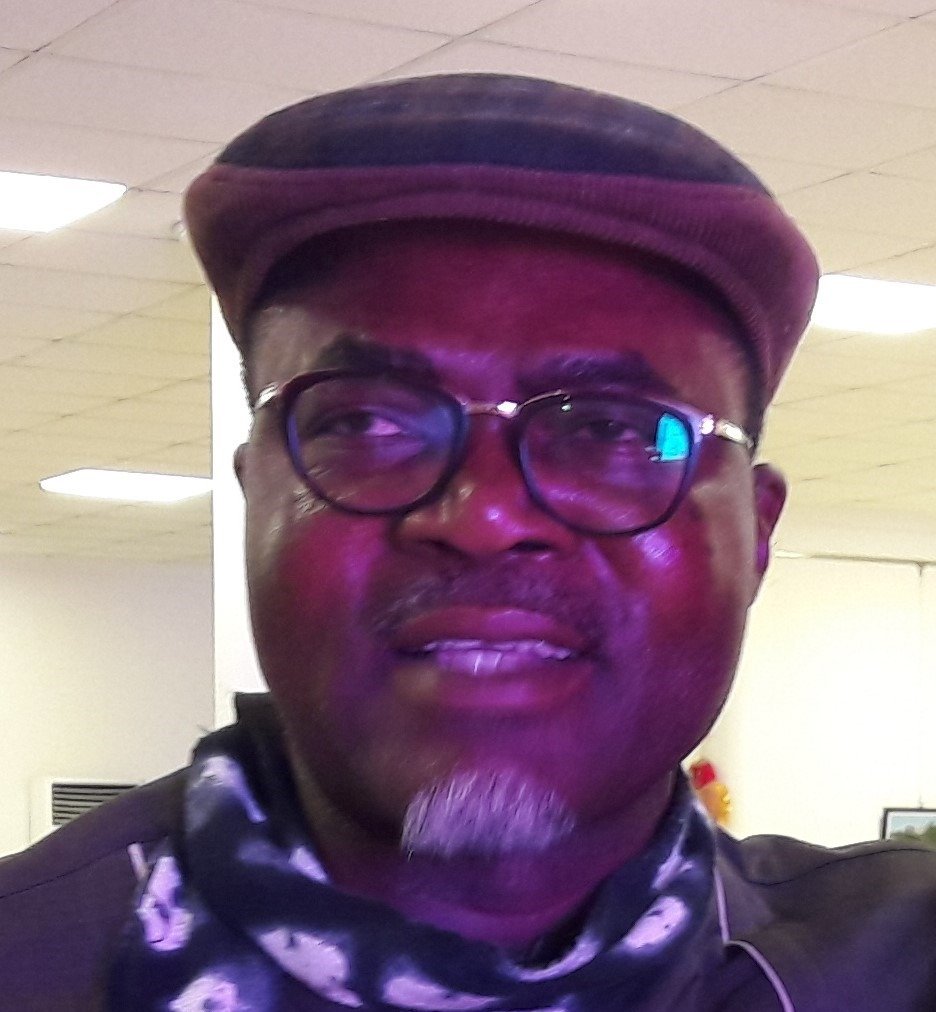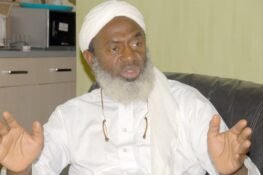Ikeogu Oke is a poet whose entry, Heresiad, won the 2017 NLNG Prize for Literature. He speaks about his work, his long journey to stardom, writing as a profession and more.
The Heresiad took you 27 years to write. Why did it take you so long?
Well, I worked on it for 27 years. This is how I calculate the duration. I moved to Calabar in 1988. At that time, I had taken a decision to become a poet, a career poet. And I moved into a house with my brother. We hadn’t even furnished the house, so I spent most of the time on the floor. Then something happened. An author published a book that sparked controversy around the world.
What book was that?
Well, I wouldn’t want to be more specific than this. So, the book sparked controversy around the world and the author was condemned to death by some religious leader. And I wondered what could be in the book that would lead to the author being condemned to death? I got curious and somewhat sympathetic with the author – the mere thought of his life being at risk. And there was the fellow feeling of a younger person who also had literary aspiration. I later had the opportunity to read an issue of TIME magazine that had the story as the cover. I read all they had to say about what transpired, why the faithful were angry and what not. And I had a friend, a senior friend who was encouraging my writing, who travelled out of the country. On her return she bought me the book. When I read the book, I thought some of the things it said were so sensitive that I wouldn’t have put them there if I were the author. Nonetheless I thought the death sentence was extreme. Besides, it was something that had to do with religion, which I would rather associate with forgiveness than vengeance. So I felt a cause for anger but not also for that kind of condemnation. Then it struck me as an opportunity to write a poem to reconcile the interests of religion on the one hand and intellectualism and creative liberty on the other, with the author’s condemner representing the first and the author the last two. I also thought it should be a poem that defends freedom of expression but urges its exercise with sensitivity to the feelings and interests of others, as it should be with any other freedom. Meanwhile I was lying on the floor, face down. I had a writing pad beside me. Then I felt a surge of poetic lines sweep through my mind, so I started writing. Some of the lines have not changed since I first wrote them. So I wrote those lines. It was almost like writing at the speed of thought, in a frenzy. Having done with the writing, I seemed to return to a normal state of consciousness. I even realized that I used a word, contemn, I had never come across. And when I checked the dictionary, I realized that it was the best word I needed where I used it. So everything seemed to fall into place almost miraculously and I kept writing as the words came to me, often like a gentle tide. Then, I had just read some of Alexander Pope’s poems written in heroic couplets. I had also written some poems in the form, so I was familiar with the form in which I was writing the poem, in which the lines were coming. So the earliest of the lines came to me more or less as an epiphany. And I looked at them and realized that they began with ‘and’, a conjunction. It was much later that I realized that, that type of beginning was referred to as “in medias res”, which means “in the midst of action”, and that, that was the way an epic poem begins. That was after I read Ars Poetica by Horace. So, I had inadvertently begun the composition of the poem “in medias res”. On closer examination, I also thought it was a germ for a long poem. So I now decided to develop it as long as possible. Then about two days later, I had a similar experience which produced the first set of lines, and it produced a few more lines which struck me as the envoi, the concluding part of the poem. So in a space of three days I had what then was the beginning and what would be the end of the poem. So I now had to face the challenge of filling the intervening space with words. And I trusted my instincts. What I then did was wait for that type of experience that produced the earliest lines continuously. And I wrote and wrote. So, in about four years, before I would enrol as an undergraduate at the University of Calabar, I had a solid first draft. By the way, I started my undergraduate studies about ten years late. I kept revising and rewriting the draft and eventually typed it out at some point. But here is the way I calculate the 27 years. After I thought I had finished the work, I sent it to my publisher, Kraft. Afterwards I was going for an appointment at the Tony Elumelu Foundation in Ikoyi when some new lines came to me.
When was this?
In 2016. I was in a taxi but had some writing material with me, so I wrote down the lines. And they struck as meant for the poem, with a clear sense of where I would insert them among the existing lines. Afterwards I called to ask the publisher if he could accommodate the additional lines. He declined, explaining that he was done, or almost done, with typesetting. Then he accepted after I convinced him that it was in the greater interest of the work. So I returned to my hotel after my appointment and updated the manuscript and resubmitted it to him. So from 1989, when the first set of lines came to me, to 2016 when that last set I would put in the poem did come was 27 years. But the main writing that produced the poem, which I later embellished and revised, lasted for about four years.
How true is it that you have a sister whose name is Eresi and that the book’s name, Heresiad, came from her name?
Not at all. Actually, Heresiad is coined from heresy. That’s because the author whose experience triggered the poem was accused of heresy. But I had a sister called Eresi, which means ‘dove’ in my Igbo dialect. She’s late, and I mourned her in a sequence of elegies entitled “A Fortnight of Memories” published in my second collection entitled Salutes without Guns.
So you sister’s name has nothing to do with the poem in anyway?
No.
The poem has now won you $100,000; how does that make you feel?
You know, it’s an amazing feeling. I mean, I’m gratified. But that’s not the kind of money I would think I couldn’t make. But I made it doing what I love. It brings a feeling that is almost difficult to describe. I couldn’t imagine such a thing happening when I started writing poetry. I didn’t embark on a literary career with such an expectation. I didn’t consider writing as something from which I would make money, though my earliest published poems were paid for. They were published in an American magazine, Unity Magazine. For each poem they accepted to publish, they offered me money, as far back as 1987. So, making money from my poetry isn’t something I wasn’t used to. But I wouldn’t have said, ‘pay me for it’. But I admired the sense of fairness in the editors of Unity Magazine offering me payment for my poems they thought merited it even without my asking them to. Poetry is something I do because it makes me happy. I was thrilled anytime I saw my work published in Unity Magazine, and whenever I saw people share them because it meant something to them. Poetry keeps my mind happy and stable and enables me add value to the world. This prize is the best reward I have had for being devoted of poetry. Actually, somebody told me to enter for the prize. It wasn’t my decision. And I told the person I still needed to improve my then unpublished manuscript of The Heresiad he wanted me to enter with, having read it and described it as “a magnum opus”. But for his persuasion, I doubt that I would have entered it for the prize. It wasn’t targeted at the price. But when something like this happens, one wonders if there are no providential forces that influence our fate. So, having what seems a case of such forces rewarding one for one’s work done without targeting the reward makes one very happy. I am utterly humbled by the experience.
How did you receive the news?
Well, I was at home. I was anxious. Like I said, I hadn’t planned the entire process. But winning became a possibility to me when I got to that last stage. So, I was coming back from somewhere that day the winner was announced. I had said I would get home and relax and wait for the news. Then I was at my desk working at home and also looking at my phone and then the news popped up on Facebook.
What was your immediate response?
Well, I had consciously planned to control my response. First, when I was coming home, I drove home quickly but slowly because in a way one could be killed by the joy of winning or the grief of losing. I simply drove home and calmly waited for the news. Of course when it came, I was excited. My household erupted in cheers. We were delirious.
Was there any time during the waiting period you thought you wouldn’t win?
I believed in my work, and I have read quite a lot of poetry. I have done that for more than 30 years. I knew the quality of work I entered for the competition. I also had, had people read it, so I wouldn’t be surprised if I won the prize.
So you never entertained any doubt?
No, no, no. There was going to be adjudication by human beings who might see things differently, and I was willing to defer to their decision as judges. But deep down, I knew that I wouldn’t be surprised if I was pronounced the winner, considering the quality of my work. I wasn’t surprised that the judges’ pronouncement met my expectation.
What would you say to the other two finalists?
I think they are fine, committed poets. It is just that the judges didn’t choose their work as the winning entry.
Do you see the cash award as the real value of the work you have done?
Well, works of art could be priceless. The emphasis really shouldn’t be on the cash award. I think the honour should matter to us more than the money, though the latter is useful.
When exactly did your interest in writing begin?
It was shortly after I left secondary school in 1984. My father wasn’t educated. He barely went to night school. In fact, I think he hated having not been educated. As a result, he came to love books deeply and somehow tried to acquire the ability to read and write passably. So you may say he educated himself. From his example, I came to love books too. So, he encouraged me and inculcated in me a very deep love for reading books. In our house then, we had a shelf with an array of books. And there were issues of Unity Magazine and a children’s magazine called Wee Wisdom for which he subscribed. Unity Church, a handier abridgement for Unity School of Practical Christianity, was the church he attended then which he was taking me to as a child. The parent institution, founded in 1886, and called Unity School of Christianity, is based in Kansas City, Missouri, USA. They published Unity Magazine and Wee Wisdom. So, one day, after I finished secondary school, I picked up one of the magazines and I saw a poem entitled ‘Buoyed by Prayer’ by one Winifred Heinskin Layton (I’m not sure I spelt the middle name correctly). I read it; it was so charming. I still remember some of the lines:
Yesterday I saw a hummingbird
Bore into a bead of honeysuckle bloom
That drapes like tassels of macramé
In my summer outdoor living room.
So, I found the imagery quite gripping. The poem was beautiful. And I said to myself, perhaps I should start writing things like this. So the next day I was walking down the street and these lines just came to me, of a poem, ‘Circulating Good’. It came full, title and all. It says:
Circulating Good
Ripples of thought
Of infinite good
Radiate forth
From my mind
Transversely travelling
Through all universe
Cleansing all things
Wholly bright.
My infinite thoughts
Of perfect good
Permeate horizons,
Cross all boundaries,
Break through all limitations
Delivering good to all.
And longitudinally
They are reflected to me
With folds of good multiplied,
Regenerating me.
You still remember all these. How old were you then?
Yes. I was 18 or 19. It was so magical. I just rushed back home to get pen and paper. I wrote it down exactly the way it came, took it to a typist; he typed it out for me and I paid. I got the address on the magazine, Unity Magazine, mailed it to them, and forgot about it. A couple of months or so later I received a mail from the editor of Unity Magazine stating that they would like to publish it. They offered to pay me $19 under an agreement called ‘partial assignment’. I signed the agreement and sent it back to them. So, about one year later, the poem was published in their magazine and they sent me six copies.
A few months later, an American wrote them that he was writing a book and he wanted to use my poem to illustrate the book, the same poem. So, they said they would have to contact the author. They sent me the letter of the person making the request, with their covering letter hinting that they would like me to grant the request. Of course, I did. So I said to myself, if people could pay me for this and someone is making a request to reprint it, perhaps I should pay attention to producing more of such things by continuing to write them. So I never had doubt about the quality of my work. If at the age of nineteen, without university education, I could write poems that people were willing to pay for in an international currency and publish across the world, I didn’t have cause to doubt that I could write them well.
Who inspired you most?
I will give that to a great number of poets. I began by reading the Romantics. Yes I read Shelley, Keats, Wordsworth, Coleridge and Byron. Then I moved to the classics: Homer, Virgil, Dante, Chaucer, Milton, Goethe, etc. Then some American poets like Ralph Waldo Emerson, Edgar Allan Poe, Walt Whitman and the French poet, Charles Baudelaire; then the Irish poets, W. B. Yeats and T. S. Eliot, and the Indian poet, Rabindranath Tagore and Joseph Brodsky. I also read Pushkin, then Alexander Pope and Thomas Gray. Then I had a particularly auspicious reading of Niyi Osundare’s The Eye of the Earth around the time I conceived The Heresiad. I found the balance it struck between aesthetic and moral tendencies very interesting and wanted to reflect that in The Heresiad. I think each of these poets and many others I have read have influenced me somehow. You know, as you read such poets, you assimilate their work even unconsciously for content and style. I was also influenced by the way the African griot renders his poetry. Yes, the traditional poets. Unfortunately, because they are not literary poets, we cannot identify with them as individuals but as part of a rather amorphous tradition. But I respect them and their contributions to the propagation of poetry.
Would you say writing is profitable in Nigeria?
It depends on the kind of profit you are looking for.
Well, is it something one can live on?
It depends. You see, I believe one can live on writing. There are types of writing that if you do them well and you are strategic in the way you ply the trade, as it were, and the way you utilize the opportunities you get, your talent and other related resources, then you can live on writing.
Can you tell us about this kind of your writing?
It may not be the same for every writer. But suffice it to say that I have lived on writing.
That’s the only thing you’ve ever done?
No, but that all I’ve done for some time now. I am speaking from experience.
The cover concept of a bird on the brook, can you tell us more about that?
The cover comprises symbols of ideas explored in the book or its thematic preoccupations. These include freedom of expression, freedom of thought, intellectual and creative liberty. There are several others. Then the blazing sword descending on the dazzling book, a symbol of knowledge, is a symbol of violence. So there’s also that joint symbolism of a clash between the book and a sworn enemy as you might consider Boko Haram.
But the sword could also be a symbol of justice
Rarely is it so, and not in this context. Then the dove brings peace upon the conflict.
That’s mercy.
Just a white door bringing peace upon the conflict. But then the poem urges mercy for the condemned author.
You have some of your works on YouTube videos. With this, do you intend to do public readings?
Yes. Actually, I am also a performance poet. So this award is, in a sense, a platform for engendering performances. And The Heresiad is actually a song, literally a song, so much so that every line of it can be sung and set to music. It is primed for performance. I call it operatic poetry, and I’m looking forward to it being adapted as an operatic work, with music, drama and all that.
There appears to be this thin line between poetry and music in your style; any reason for that?
No, but I realized at some point after I started writing poetry that my poetry can be simultaneously musical without my being conscious of it. I write a poem and also realize that what I have written is equally musical or song-like. And it is not deliberate; I just write by instinct. After writing the poems, I sometimes find out that some, or all of the lines, can be sung. What I now do is polish the lines to impeccable musicality if need be. But there’s often no need for such extra work.
Many think that the art of creative writing is dying. Do you also think so?
I don’t think so. I had earlier said that things like this NLNG Prize have contributed to keeping it going. But there are issues because of our values as a people. This has to do with the fact that we quite often seem to lay emphasis on the wrong things. Now, you would notice that being a writer is not as rewarding as being a politician or a musician, at least in material terms. Recently, I read a rather depressing post on social media by someone who claimed to be a poet, saying that no poetry book is worth a certain amount of money. And I wondered, if our poets feel this way about the value of what they do, what should they expect from those who are not poets or the society In general?
Has it always been like that?
I think self-belief is a major problem here. It is a major factor regarding success. Poetry may not be very rewarding in material terms, but if poets believe in what they do, they could improve its material value. I mean, if I make a billion dollars as a poet, I wouldn’t be surprised because I believe the value of poetry and the gains it can attract to the gifted, committed and hardworking poet actually cannot be quantified. The works of Shakespeare could be worth billions if you consider the chains of businesses built on his legacy. And he was a poet. For poetry to become lucrative in Nigeria, the people and the poets would need a value reorientation. The people would need to be made to understand that this thing has value for them. Of course, one can’t imagine being a poet without considering how one’s work benefits one’s audience. The poets have to think of how to make what they do a source of value and joy for others. That’s actually a major factor for success – creating value for people. So, what we haven’t done really is devise a means to make people take poetry as something valuable for which they should patronize it.
What do you consider the significance of the NLNG Prize?
There is something that happens through literature all over the world. I call it the phenomenon of a tree making a forest. Literary worlds often develop around individuals – the likes of Shakespeare, Goethe, Cervantes, Tolstoy, etc. Such are the single trees that have become vast literary forests, extending beyond their native countries to all parts of the world. I believe the prize has the potential for uncovering such trees that can make a forest and bring global and lasting honour to our country like those trees that can make a forest in literature. But even as things stand, it is making a positive impact by stimulating and rewarding literary creativity. We cannot all watch our society devolve into crass philistinism and I think this prize is a genuine intervention against such cultural degeneration.
Some would say that this kind of money, energy and the research would be better devoted to science?
Well, science is very important. But I think we have enough resources in the country to support both the arts and the sciences. I don’t think one should take the place of the other. It is desirable to have prizes for the sciences also.
Tanure Ojaide, with his book, Songs of Myself, was your closest competitor. What do you think about him?
You know, I think he put in his best. I am familiar with his poetry; I have been for a while. He is my senior friend, if I may put it that way. In fact, when I lived in Calabar, before I enrolled as an undergraduate, I read his collection, The Fate of Vultures. Then I responded with a poem entitled ‘Apologia’, a defence of the vulture from the opprobrium the world normally heaps on it, apparently without reflection. I thought: what is the vulture’s sin that everyone calls it a bad name? I compared the vulture with the much-admired eagle. The vulture is an avian undertaker, disposing of dead bodies by turning its stomach into a cemetery of sorts. That’s some useful service to nature that hurts no one. Yet everyone maligns it. But the eagle is a killer, a murderer, a ruthless predator, plundering life out of less strong and mostly defenceless animals. Yet it is the king of birds that everyone would rather be like if they could be birds. If human kings were to be brazenly predatory like the eagle, hunting and killing their subjects at will for food, I’m sure their victims and other subjects won’t find their royal cannibalism acceptable. But we admire the eagle with its murderous life and despise the vulture that waits for things to die before eating them and do not realize the immorality of our affection for the one and the unfairness of our antipathy towards the other. That’s my argument in the poem in response to Ojaide’s The Fate of Vultures. I am familiar with his work. He put in his best. (It’s) just that I write poetry differently from him. I think he is a committed poet.
Would you think anyone who is critical of the prize is wrong?
Well, what I think is that if you enter for a prize, what the judges say is final. I had my opinion but I was never going to express it before the judges had ruled. I just think it is not right; it shows lack of discipline. That’s why I said I was deferring to the judges’ decision. So, if the judges said that my entry was the best, then it was. It also depends on the specific nature of the criticism. Most of what I’ve heard people say against the prize wouldn’t even qualify as criticism if subjected to close scrutiny. Being censorious is not necessarily the same thing as being critical.
What inspires you to write: joy, sorrow, tragedy?
Everything!
Is any of your children taking after you?
Yes, my first daughter.
How old is she?
She is nine, and sometimes she writes things I find remarkable.








